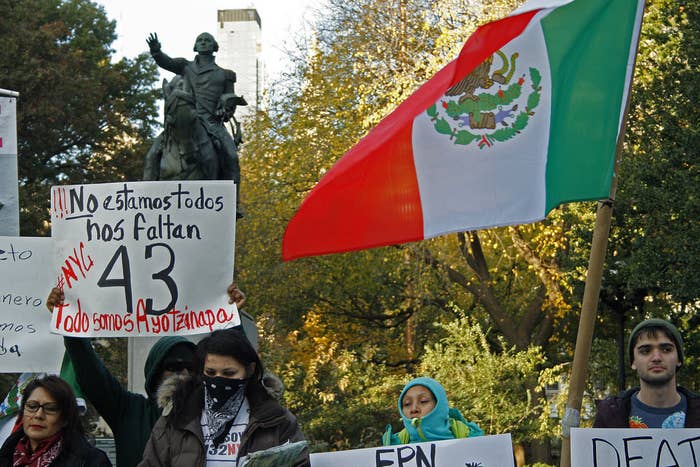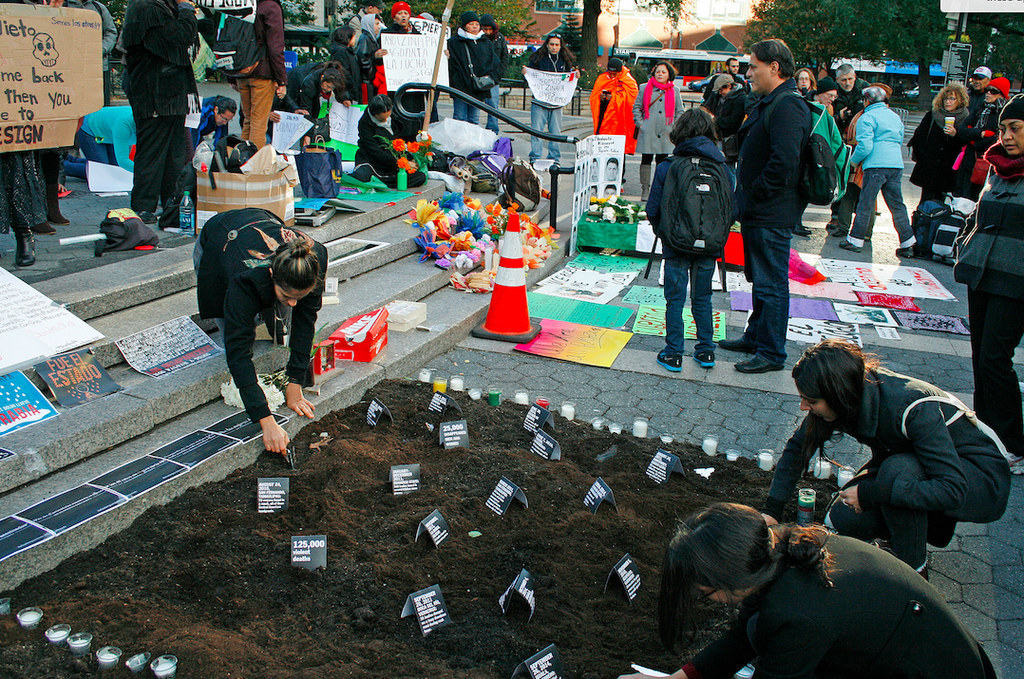
Iguala Mayor Jose Luis Abarca was arrested by Mexico City police officers, a police spokesman told the BBC on Tuesday.
Abarca and his wife were fugitives. Mexican officials accused Abarca of intercepting the students on the day of their disappearance.
Galvanized by the kidnapping and murder of dozens of students in the Mexican state of Guerrero two months ago, Mexicans abroad are mobilizing to hold the Mexican government accountable. Through open letters, protest gatherings, and social media, Mexican students across the globe are demanding that the missing students be returned, and that any public officials complicit in the killings — by commission or omission — be prosecuted or resign.
The protesters hold the Mexican government responsible for the failure to find the 43 students that remain missing, and for creating the deep-rooted culture of corruption and violence that allowed for the killings and kidnappings to happen. The local police in Iguala, Mexico, along with the city's mayor and his wife, have been directly implicated, along with regional drug cartels, in the crimes.
On Sunday, some 150 protesters gathered at a makeshift Day of the Dead altar in Union Square in New York City, created to commemorate the students as well as the hundreds of thousands who have died in the eight years since Mexico launched a full-scale military assault against drug cartels, which in many parts of Mexico wield more power than the government.
A normally lighthearted holiday, the protesters' distorted commemoration of Día de Muertos turned into a somber display of political anger.
"We can no longer have this festive relationship with death, this light-hearted relationship," said Humberto Beck, a Mexican Ph.D. candidate at Princeton University who helped organize the protest. "That communion between the living and the dead, the basis of the ritual, is no longer possible. The disappeared are people between life and death. We cannot celebrate them if we don't know that they're dead."
The protesters chanted: "Gobierno farsante que matas estudiantes" — "Corrupt government that kills students."
For the protesters, Mexico has become a country where the search for the missing only adds to the vast quantities of the dead, and where corruption is such that murderous drug cartels and the government — be it the armed forces, local police, or elected officials — are often inextricable. This is what Mexican novelist and journalist Juan Villoro, writing about the missing students for the Spanish newspaper El País, described as "a country where politics increasingly becomes a funeral rite."

Mexican students, professors, and researchers at universities abroad have also collaborated on an open letter addressed to Mexican President Enrique Peña Nieto and a number of other high-ranking officials. The letter was delivered by hand Monday morning to the Mexican consul in New York. Over the last two weeks the same letter has been delivered to consulates and embassies in other cities including Washington, D.C., Buenos Aires, Rio de Janeiro, and Barcelona. The letter has gathered close to 14,000 online signatures from more than 80 countries.
"This is a problem of the government," said Ivonne del Valle, a professor at the University of California, Berkeley, who delivered the letter to the consulate in San Francisco. "It's not only that the students were killed. This case in particular shows how the government is deeply implicated at every level."
"What we're asking the government is not radical," del Valle added. "We're asking for rule of law."
The Mexican embassy in Washington, D.C., confirmed to BuzzFeed News that it had received the letter and provided the response that it gave to the protesters. "The Government of Mexico categorically condemns these deplorable acts, in the face of which there is absolutely no room for impunity. These outrageous acts of violence are painful and unacceptable," the statement says.
In the statement, the embassy also detailed several steps the government has taken to investigate the murders and kidnappings, including seizing all guns from Iguala's municipal police force for ballistics tests.
Nevertheless, protesters both in Mexico and abroad continue to fault the government for what they decry as its inaction and complicity in the disappearances. In Mexico, tens of thousands have taken to the streets in recent weeks. Some protests have culminated with demonstrators setting fire to state and local government buildings.

The murdered and kidnapped students belonged to the Ayotzinapa Normal School, a teacher training college in rural Guerrero known as a historical site of left-wing political organizing. On September 26, as students from the school were preparing to stage protests, they were attacked by masked gunmen in Iguala. Municipal police officers were later found to have been among the attackers. Six people were killed, and 43 students from Ayotzinapa were kidnapped.
The search for the missing students has turned up 19 hidden, anonymous graves in the environs of Iguala.
The mayor of Iguala, José Luis Abarca, was reportedly with the colonel in charge of the local army base at the time, raising questions about the army's absence during the attacks. Albarca and his wife, María de los Ángeles Piñeda — both of whom are currently fugitives from the law — are also reputed to have links to Guerreros Unidos, a powerful drug cartel in the region.
Several activists told BuzzFeed News that, in their experience, the scale and breadth of mobilization by Mexicans abroad in response to the missing of Ayotzinapa is unprecedented, at least compared to the recent past. While various social movements in Mexico have generated scattered solidarity groups in foreign cities, Ayotzinapa has triggered a loose yet coordinated and coherent response on at least three continents.
"I see a difference in the scale, but above all a difference in the intensity" of the response, Beck told BuzzFeed News. While previous movements were explicitly political, "here the issues are so profound and so fundamental that they transcend the political. There has been a phrase circulating recently: If you're not angry, it's because you haven't noticed."
